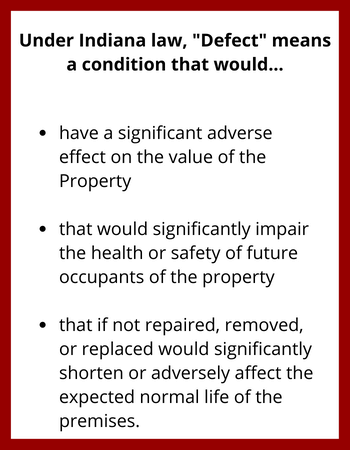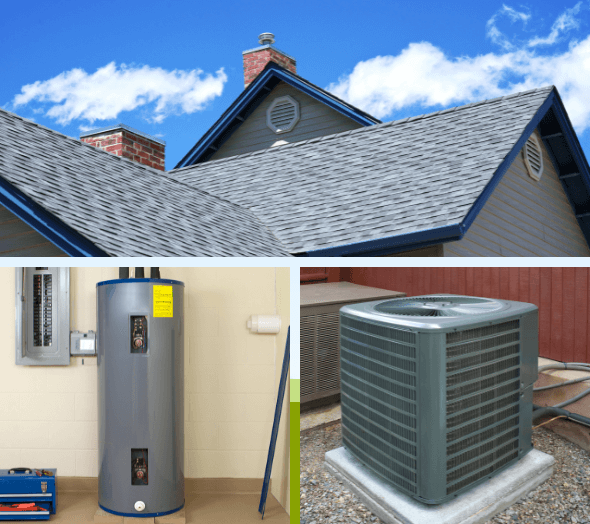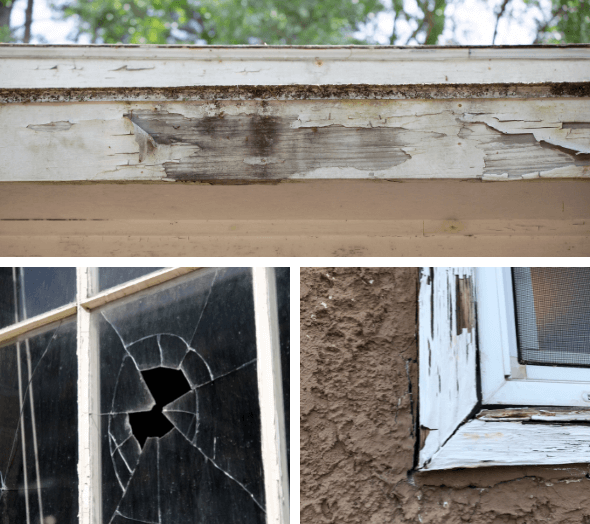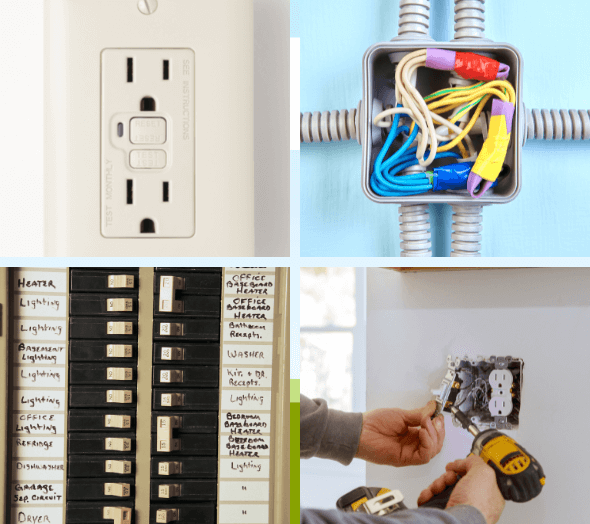Top 5 Home Inspection Issues
Home Inspection Issues have caused both buyers and sellers a lot of gray hairs throughout the years.
Knowing what to expect, how to read the report and what items should be repaired can help you feel a lot more confident going into the process – regardless of whether you are a buyer or seller.
The image to the right is included in the Indiana State, Realtors Purchase Agreement. It spells out how a “defect’ is defined for both parties.


#1 – Roof & Mechanicals
Not surprisingly, the above items should be number one on the repair list if there are defects.
A roof is obviously designed to protect the inside of the home from environmental elements like rain, sleet, snow, etc… The inspector will usually walk it (weather permitting) and let you know if there are soft areas of the decking or missing shingles or even outright damage.
These types of things are definitely something that should be addressed during the inspection period.
Let’s admit that some roofs just aren’t very aesthetically pleasing. However, as long as it is working as intended (no leaks or damage), a seller is not expected to replace it.
The inspector will also check the major mechanicals like furnace, AC unit and hot water heater to ensure they are working as intended. If they are unsure, they will report to have a contractor take a closer look.
All of these items qualify are major and should there be a defect with them, a buyer should ask for the repairs.
#2 – Peeling Paint – Wood Rot – Broken Windows/Doors
Some loan types (FHA, USDA, VA, etc…) will require that peeling, chipping paint be scraped and re-painted as part of the financing contingency. Usually, the appraiser will make it a condition of the appraised value that these items be repaired.
Since paint helps protect the integrity of the wood it covers, peeling paint can adversely affect or shorten the expected life of the structure. It allows moisture and deterioration of the wood/framing of the home. In addition, if wood rot has occurred, most mortgage holders/appraisers will make it a condition of the appraisal to have those items repaired, as well.
Broken glass in windows or doors poses a safety issue for those living in the home and should be repaired.
Also, for safety, windows and doors should operate as intended so that occupants can get out of the home in case of fire or other disaster.
All of these types of items should definitely be repaired.


#3 – Electrical
Electrical problems can show up on an inspection report in various ways. Some might include:
- Loose Outlet/recepticle
- No Junction box for electrical connection
- Missing GFCI outlets within 6 ft of water source
- Non-working light fixture
- Double Tapped Breakers
- etc…
Since faulty or damaged electrical items can cause fire and more, the above items are considered safety hazards and should definitely be addressed in the Buyer’s Inspection Response.
#4 – Foundation/Crawl Space/Slab
An inspector will look for signs of deterioration or damage on the foundation of the home, regardless of the type of foundation.
Since the foundation is integral to supporting the structure, the inspector will recommend further investigation from a qualified contractor if they find signs of damage.
These types of repairs would definitely need to be made to protect the home and it’s occupants.
It would also include checking on the floor joists and under structure if the home sits on a crawl space.
The inspector might make a suggestion to add gutter extensions to ensure rain water flows away from the home and not into the crawl space or towards the foundation.
Or, it could be more serious. The inspector will check things out and make his/her recommendations to ensure the integrity of the home.


#5 – Plumbing
If the inspector finds evidence of a leak (past or present) they will make not of it in their report. A leak can start out small but can lead to deterioration of floors, ceilings, walls, etc… if not repaired.
He/She will look at all water sources and the accompanying plumbing for tell tale signs and make recommendations. Active leaks should be repaired immediately and small drips fixed asap before they turn into bigger problems!
Even a loose toilet can cause a wax ring to fail and allow water into the flooring and crawl space harming joists or ceilings if the toilet is on a second floor.
Moisture is definitely the cause of mildew, fungal growth and deterioration of wood and should be addressed!
Home Inspection Issues
Remember, it’s the job of a Home Inspector to point out every single thing they find during their inspection. However, according to the Purchase Agreement, the items the buyer asks to be repaired should be “Defects,” as defined by the State of Indiana.
Don’t let a 50 to 75+ page inspection report scare you. They are reporting “every little thing!”
A Home Inspection is a “snapshot” in time. It’s the condition of the home on the day an inspector is there. They only know the condition of the home during the specific time they are there.
Anything can happen at any time. Shortly after we closed on my house, the water heater died. It wasn’t the inspector’s fault – it was working as intended when the inspector was there. He didn’t have a crystal ball to know it would breakdown.
It wasn’t the seller’s fault. They did nothing to the water heater. It was just bad luck. We replaced it and moved on!
Read the professional inspector and then talk things over with your Realtor. Together, you can formulate a response to an inspection report or a seller can formulate their response to the Buyer’s Inspection Response and stop those home inspection issues in their tracks!




